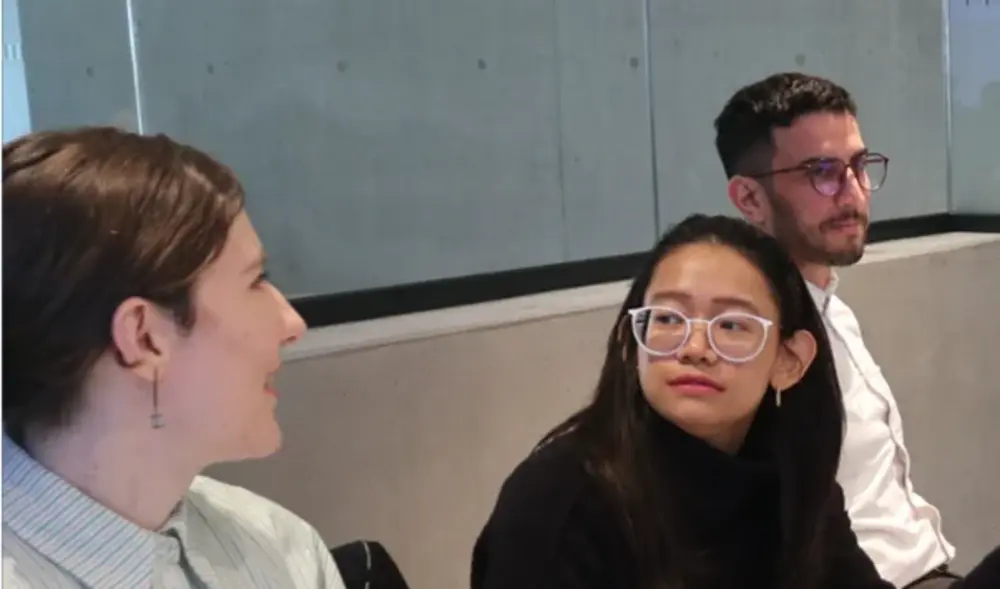Digital Transformation in Vocational Education: Emerging Trends and Prospects for the German State of Thuringia

Digitalization presents both challenges and opportunities for the state of Thuringia. During the recent European Week (EUROPAWOCHEN) in Erfurt, the city’s Theater was transformed into a space for showcasing democracy, and Brandt School students had the opportunity to showcase how their projects are impacting the local community. Among those projects was the Digital Transformation in Vocational Education initiative, the result of a Brandt School project group that addressed the major policy challenge of leveraging digitalization in the state’s vocational training system.
The Challenge
Germany’s strong economy owes much of its success to the highly effective dual vocational education and training (VET) system, a unique approach that combines classroom learning with practical training in real-world workplaces. According to the Federal Ministry of Education and Research, almost half of all school-leavers receive vocational training from companies, contributing significantly to Germany’s low youth unemployment rate and the cultivation of high skilled workers in the country (Federal Ministry of Education and Research, n.d.).
However, the landscape of vocational education is undergoing rapid transformation along with the waves of digitalization, presenting both challenges and opportunities. Where does Thuringia stand? What are the challenges and what is the way forward for the state to adapt to the demands of a digital era, ensuring that the workforce remains competitive and equipped with the skills needed to thrive in an increasingly digitalized economy?
To answer these pressing questions, the Willy Brandt School of Public Policy and the Digitalagentur Thüringen GmbH recently collaborated on a public policy challenge to inquire about the status of digitalization in Thuringia’s vocational training institutes and schools. The project group comprised six students from the Brandt School, with the guidance of Project Supervisor Dr. Hasnain Bokhari. The initiative sought to provide policy recommendations for Digitalagentur regarding the issue. In addition, the team engaged with different stakeholders and regional, national, and international experts, such as those from UNESCO and GIZ, to collect the insights and perspectives crucial to understanding the nature of digital transformation in vocational education. Thorough research and dialogue with key stakeholders in the digitalization of vocational training in Germany resulted in a report outlining a roadmap to advance policies in the state. Infrastructure, teacher training, and governance emerged as the main challenges for developing a training system capable of adapting to the ever-changing demands of the digital era.
How does the client perceive the impact of digitalization on vocational training? What are the takeaways from the project?
Roberto Schmidt, Head of ThEx Economy 4.0, Thuringia Digital Agency (Digitalagentur), said, “Digital education can be found in all areas of human development. In the area of primary and secondary education, there are a large number of political and business initiatives to support and develop this in the long term. However, there is a lack of comparable initiatives in the field of adult education….[such as] vocational training and continuing professional development. Educational institutions often have to try to keep up with the innovative trends in the labor market through individual private solutions. It was important to the Digital Agency Thuringia to find out the current status of digital education in adult vocational education.” Doing so, he said, “help[ed] the Digital Agency Thuringia to better understand the current status and demand on the education market and thus to be able to respond specifically to the individual needs of the decision-makers involved.”
Through the report, available funds were identified, teachers’ sentiments regarding the use of technology in teaching were assessed, and compatible benchmarks were explained. The group project was able to showcase with practical examples how technologies have been introduced in schools and how different institutions are promoting digital skills among teachers and students. It also outlined the governance structure necessary for fostering close collaboration between industry and the vocational training system, ensuring alignment between the supply and demand of new skills driven by emerging technologies.
Reflecting on the project
Our project was a challenging and rewarding one:
“Reflecting on our journey, I'm truly amazed at how far we’ve come, from starting with just an idea to crafting a comprehensive policy report. The diverse perspectives and unique skillsets of our team members have been invaluable. The experience has been an eye-opener for me personally and professionally, and I can’t wait to see the results of our efforts. I truly believe we’re making a difference, one step at a time, in shaping the future of vocational education in Thuringia.” – Su Wai Phyoe (project member)
“Understanding how to enhance digitalization in vocational training within the state was no easy task, particularly because Germany is one of the world’s leaders in vocational training systems. Segmenting the related policy areas and comprehending the ongoing projects at both federal and state levels were crucial to reduce complexity and set clear pathways to advance the digitalization agenda in Thuringia.” – Roman Bertoldo Coutinho (project member)
Our group’s guidance came just in time, especially with the upcoming “Digital Pact School 2.0” in 2025 (Digitalstrategie Deutschland, 2022, p. 14). By leveraging the insights gained from various experiences and tailored to the state’s context, Thuringia will be well-equipped for the next phase of digital transformation in vocational schools.
Project group members: Dr. Hasnain Bokhari (Supervisor), Roman Bertoldo Coutinho, Estelle Delhaye, Paulina Gómez, Shreesh Karmarkar, Alyssa McIntyre, Su Wai Phyoe
References
Digitalstrategie Deutschland. (2022). Digital strategy: Creating digital values together. Bundesministerium für Digitales und Verkehr. https://digitalstrategie-deutschland.de/static/eb25ff71f36b8cf2d01418ded8ae3dc2/Digitalstrategie_EN.pdf
Federal Ministry of Education and Research. (n.d.). The German vocational training system. Retrieved May 3, 2024, from www.bmbf.de/bmbf/en/education/the-german-vocational-training-system/the-german-vocational-training-system_node.html
About the Authors

Roman Bertoldo Coutinho, Brazilian, Bachelor of Public Management from the Federal University of Rio de Janeiro; he worked for two years for the Brazilian Institute of Geography and Statistics and two years with technical assistance for recycling cooperatives. At the Brandt School, he is specializing in Social Economic Development and Global Public Policies.

Su Wai Phyoe has worked with non-governmental organizations for more than ten years. Under EU-funded projects, she contributed to promoting political participation in Myanmar’s reform processes, such as elections, and women leadership in local democracy. She discovered her new interest in the relationship between digitalization and its effects on society while attending the Brandt School. Developing policies for fair work practices in the face of technological improvements is her area of academic interest. Her thesis investigates how digitalization has affected labor rights and the nature of work in Southeast Asia.
~The views represented in this blog post do not necessarily represent those of the Brandt School.~